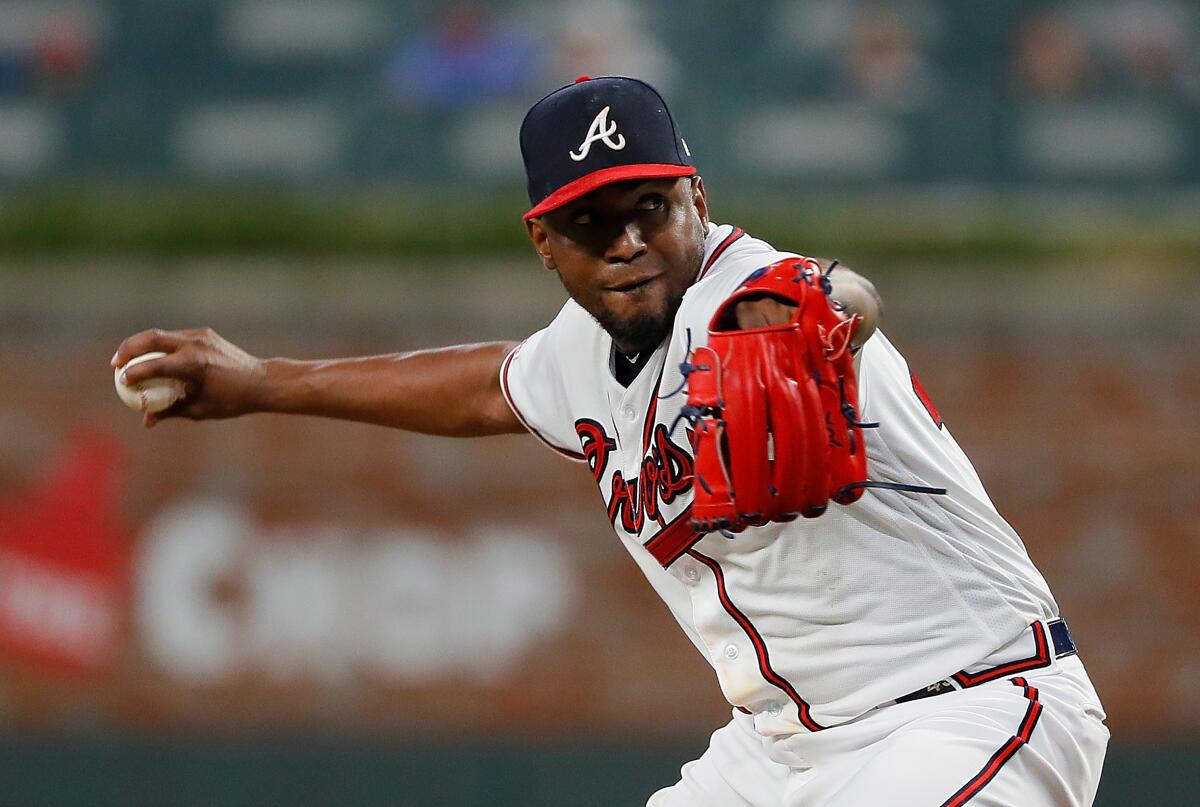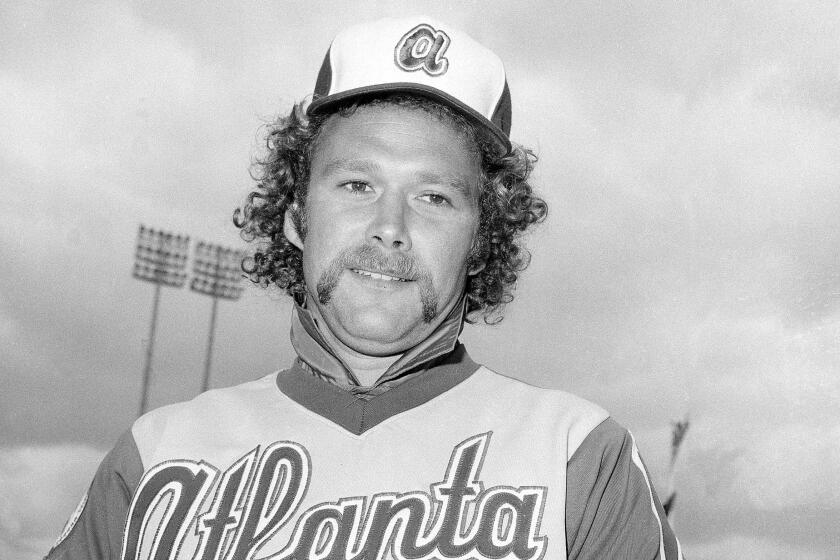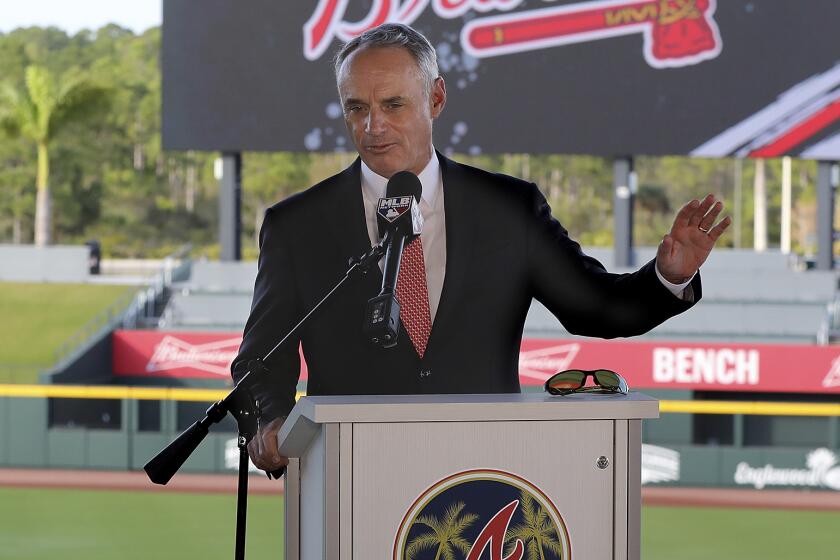Julio Teheran begins anew in fresh start with the Angels

- Share via
TEMPE, Ariz. — New Angels starter Julio Teheran was left off the Atlanta Braves’ postseason roster nearly five months ago. Some 30 days later, in November, the team that had nurtured his rise as one of baseball’s best prospects and featured him in its rotation for seven seasons let him go.
Teheran did not take it as a slight. The sting lasted briefly.
“It was difficult at first,” Teheran, 29, said in Spanish. “After spending my whole career since I was a kid with the Braves, I couldn’t help but feel emotional. But I understand that it’s a business and it’s my career, too. I took the decision professionally. I knew that my future depended on me moving on with another team.”
That Angels need Teheran, who signed a one-year contract for $9 million in December, to be a leader for a pitching staff that posted some of the worst numbers in recent franchise history. After one week getting to know him at spring training, manager Joe Maddon believes Teheran is up to the task.
“The conversation was easy with him,” Maddon said Sunday. “The fact that he’s a veteran player still looking to get better and he’s willing to accept information from a new group so readily, that’s what I got out of it. … I think he is aware that there is another level for him.”
Teheran spent the months of his offseason as he usually does — maintaining his 6-foot-2, 200-pound form, refining his main breaking pitch and focusing on the rudimentary things that catapulted him into the major leagues eight years ago.
Teheran was a teenage star in his native Colombia. He was named one of the Braves’ top 10 prospects soon after he signed at 16 for $850,000. He retained the status as he climbed the minor leagues at a rapid pace. Despite always being among the youngest players at every level, he assailed hitters and rarely had trouble limiting walks.
Armed with a 93-95 mph fastball and beyond-his-years poise, he debuted in the major leagues at 20. But he didn’t stick with the Braves until he was 22 and had ironed out mechanical issues in his delivery, changes that sapped him of some velocity but boosted his overall effectiveness.
“It was a lot to take in,” Teheran said. “I didn’t have the right mentality, so I had to adjust. And being No. 1 in the rotation is a big responsibility. People are expecting a lot of you. I took that personally, knowing that I was there for a reason. I was representing the team’s rotation. That’s really important for a team. So that’s what took me time.”
A trade between the Dodgers and Angels that made a big difference sent Andy Messersmith to L.A. and Frank Robinson to Anaheim, but Steve Garvey stayed put.
Teheran went 14-8 with a 3.20 ERA in his breakout 2013 season. Among rookies, he recorded the second-most strikeouts (170) and second-most innings (185 2/3).
The Braves rewarded Teheran with a six-year, $32.4-million contract extension shortly after he turned 23 in 2014. He continued to shine. On his way to accumulating 221 innings and dazzling opponents with a 2.89 ERA, he became an All-Star for the first time that summer. He hardly slowed. He provided nearly double the value of his contract from 2014 to 2016, according to Fangraphs, which retroactively converts a player’s worth to his team (Wins Above Replacement) to the market value the team would have paid to replace that production in any given year.
Regression occurred in the three years that followed. Teheran’s slider, once his best offering, lost some of its effectiveness. His fastball now averages 90 mph. His walk rate soared.
At the end of last season, Teheran gave up 14 earned runs while totaling 11 1/3 innings over his final three starts. He had maintained an acceptable 3.81 ERA — he even produced a sterling 2.67 ERA from May 5 to Sept. 7 — but the Braves were so worried by the trends that they excluded him from their initial postseason roster in October.
Teheran, who went 10-11, did not begrudge the Braves their decision. When they later bought out the $12-million option on his contract and exposed him to the free market for the first time, he understood that, too.
“You have to let those things go and look forward,” he said.
‘I don’t think there’s a player ... who relishes the idea of being a 2017 Houston Astro answering questions about what happened and why it happened.’
For Teheran, looking forward involved peeking into the past. He worked this winter with his lifelong pitching coach and uncle, Miguel, to eliminate the bad habits he had formed on the mound. They corrected his arm action and improved his release point. They tinkered with his slider, off which batters hit .260, the highest average in Teheran’s career.
All were small tweaks, but he arrived at his new spring training destination encouraged.
“If I had a good season despite a few things I needed to address” last year, Teheran said, “then I think fixing those things should help.”
More to Read
Go beyond the scoreboard
Get the latest on L.A.'s teams in the daily Sports Report newsletter.
You may occasionally receive promotional content from the Los Angeles Times.









